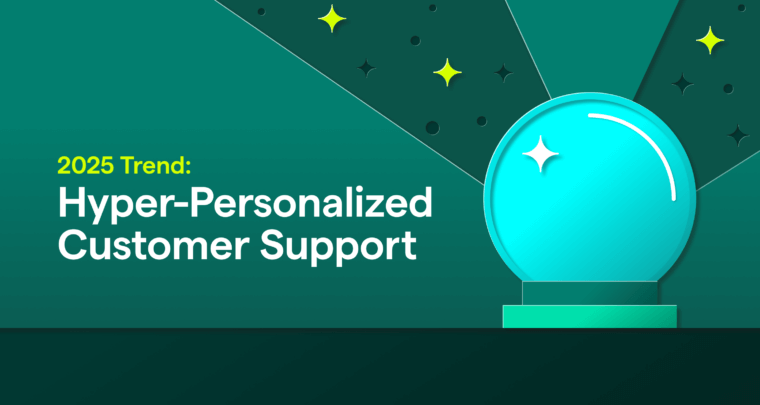
To date, the biggest evolution in customer support has been in hyper-availability. Businesses are effectively supporting customers at any time, on any channel, and with self-serve, automated, and live interactions.
The next transformation will be hyper-personalization driven by a mix of human and AI agents. While gen AI has already brought new efficiencies to CX teams, agentic, autonomous AI will bring new personalized experiences to customers. This will not be through automated gimmicks but from new understandings of customer needs and preferences.
What is hyper-personalization in customer support?
Adding a customer’s first name to an email doesn’t equal personalization—thoughtful context is key. True hyper-personalization means each interaction feels effortless and deeply relevant to the customer. It’s about creating experiences that increase reward, reduce frustration, and build trust. This will require shifting from a reactive support model to a proactive value-creation model that anticipates customer needs.
The introduction of AI agents, which are both autonomous and context-aware, will usher in this next generation of customer support. Autonomous AI agents can initiate actions, make decisions, and adapt independently based on goals, data, and desired outcomes. AI agents will not only streamline CX teams’ workflows, they will manage more and more complex customer queries from ticket to resolution. This will give support agents the immediate benefit of more mental space to devote to high-value interactions. While AI agent–driven support will continue to improve in empathy and personalization, the larger benefit will be in the truly bespoke customer experiences AI will enable team members to offer.
The AI-enhanced 360 customer view
Historically, one of the biggest challenges in CX has been creating a 360 view of the customer across siloed systems and data. Customers engage with different team members and tools, resulting in unstructured and unusable data. Within this data, though, is the key to truly personalized experiences, if you can uncover it––swiftly and at scale. AI’s emerging agentic capabilities will enable CX teams to do this.
Today, siloed, unstructured customer data is unusable due to its enormity. Structuring it also requires time, which most companies lack. AI won’t structure your data, but it won’t have to. With its foundation in natural language processing and machine learning, AI will identify and extract behavior patterns, key information, and sentiment insights from approved data sources.
Agentic AI will take this further by making independent, real-time decisions on which data and systems to investigate to surface the best insights. These always-on, always-questioning AI agents will enable CX team members to better predict customer needs, align with a broader set of customer preferences, and be alerted to potential customer churn risks before a query is ever made.
How customer support will evolve in 2025
Now let’s speculate on how AI and hyper-personalization will evolve customer support in the year ahead. Here are five predictions that I believe we’ll see in 2025:
- AI will anticipate customer needs, transforming support from reactive to hyper-personalized and proactive. In 2025, AI will be a strategic asset for detecting and addressing issues before they arise. Analyzing customer data in real time, agentic AI will detect potential issues and enable CX teams to deliver proactive support that’s seamlessly tailored, enhancing customer satisfaction through unique, preemptive resolutions.
- Humans and AI agents will collaborate to enhance customer support. This collaboration will be twofold. First, environment—and context-aware AI like Grammarly will act as real-time advisors for human agents, offering insights to personalize each customer interaction. Second, autonomous AI agents will automate routine tasks, freeing human agents to focus on complex cases where empathy and personalization are essential. This partnership will drive richer, more impactful customer experiences.
- Chatbots will transform from rigid responders to no-code assistants. AI chatbots, better known now as AI agents, will become more flexible and human-like, shifting from rigid, robotic responses to dynamic, personalized conversations. With no-code, plug-and-play deployment, CX teams can launch these tools quickly, reaping immediate benefits and taking the workload off of team members without extensive setup.
- Smarter AI deflection will reduce caseloads, giving agents time to drive deeper value. Advanced AI will deflect cases efficiently, mimicking human precision by reflecting customer histories and preferences. This will reduce caseloads, allowing agents to focus on high-impact initiatives that add value and drive customer satisfaction.
- Omnichannel consistency will strengthen customer trust. As hyper-personalization increases, consistency across channels will be essential to maintain trust. AI communication assistants will play a critical role in tracking and analyzing interactions, ensuring that customers receive consistent, hyper-personalized support at every touchpoint.
Preparing your CX teams for the future
As we look to the future, these predictions are simply that: educated guesses. While they’re grounded in current trends, they’re not certainties. If we want to ensure we’re well-positioned to harness AI to deliver hyper-personalized support at scale, there are practical ways we can prepare our CX teams to embrace these possibilities.
- Reinvest in uniquely human skills. To thrive in an AI-powered landscape, CX professionals must embrace new competencies, balancing technical knowledge with essential interpersonal skills. As artificial intelligence increasingly handles the transactional components of customer service, it becomes vital for human agents to enhance their skills in emotional intelligence and empathy—particularly for addressing complex or sensitive issues where a compassionate, personal touch is crucial. Learn more in The Global CX Communication Playbook.
- Increase CX data literacy. Cross-functional collaboration and data literacy are critical. To optimize AI tools effectively, CX professionals must collaborate closely with cross-functional teams such as data scientists, IT teams, and product teams. This partnership ensures that AI’s capabilities align with your customers’ needs, bridging the divide between technical systems and customer-facing operations. By fostering strong collaboration and communication skills, CX professionals can better interpret AI-driven insights and turn them into actionable strategies that benefit both customers and the business.
- Double-down on security and privacy. No degree of speed or personalization outweighs customer trust, which can be instantly eroded if customers believe their data and privacy are poorly handled. The same privacy standards companies expect from their employees will need to extend to AI agents. This includes access and data minimization controls that ensure only essential customer data is accessible and only for the specific period of time it is needed. For the foreseeable future, this will also require human-in-the-loop practices to monitor how AI internally operates across systems, the insights it returns to team members, and the experiences it offers to customers.
- Experiment, innovate, and refine. Ultimately, the future of hyper-personalized customer support lies in embracing AI’s potential while ensuring human interaction remains central to the experience. By empowering CX teams with the right tools and training, businesses can deliver efficient, empathetic, hyper-personalized support that resonates with customers. This balance will be key to building lasting customer relationships and driving business growth in the era of AI-driven CX.
By harnessing AI alongside human expertise, CX teams can deliver hyper-personalized support at scale, creating seamless, impactful experiences that build lasting customer loyalty and drive sustainable growth.






